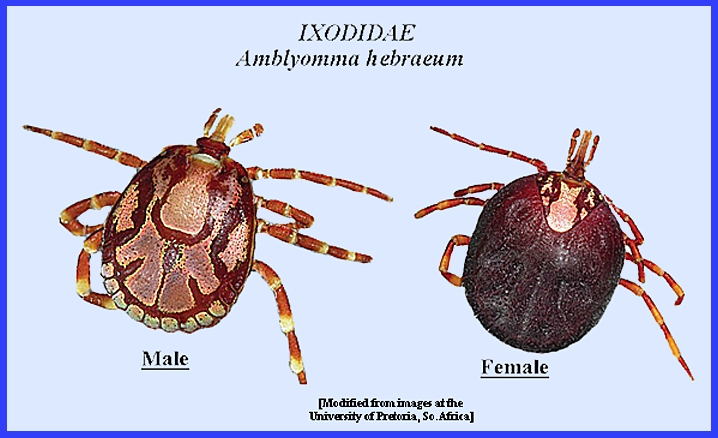File: <ticktyphus.htm> <Medical
Index> <General Index> Site Description Glossary <Navigate
to Home>
|
TICK TYPHUS (Contact) Please
CLICK on
Image & underlined links for details: The
Rickettsial disease known as Tick
Typhus occurs in widely separated
regions, such as Siberia, India, East Africa, Australia and Some of the
more important kinds of Tick Typhus are Rocky Mountain Spotted Fever,
Mediterranean Spotted Fever, African Tick-bite
Fever, Siberian Tick Typhus,
Queensland Tick Typhus and Oriental Tick Typhus. Other unnamed types exist. Key References: <medvet.ref.htm> <Hexapoda> Camicas, J. L., J. . Hervy, F. Adam & P. C.
Morel. 1998. The ticks of the world (Acarida,
Ixodida): Nomenclature, Described
Stages, Hosts,
Distribution. Paris: Editions
de l'ORSTOM.. Gammons, M. & G. Salam. 2002. Tick
removal. Amer. Fam. Physician
66: 643-45. Gothe, R., K. Kunze & H. Hoogstraal. 1979.
The mechanisms of pathogenicity in the tick paralyses. J. Med. Ent. 16: 357-69. Hoogstraal, H.
1966. Ticks in relation to
human diseases caused by viruses.
Ann. Rev. Ent. 11: 261-308. Hoogstraal, H.
1967. Ticks in relation to
human diseases caused by Rickettsia
species. Ann. Rev. Ent. 12: 377-420. Legner, E. F. 1995.
Biological control of Diptera of medical and veterinary
importance. J. Vector Ecology 20(1):
59_120. Legner, E. F. 2000.
Biological control of aquatic Diptera. p. 847_870.
Contributions to a Manual of Palaearctic Diptera, Vol.
1, Science Herald, Budapest. 978 p. Matheson, R. 1950.
Medical Entomology. Comstock
Publ. Co, Inc. 610 p. Needham, G. R. & P. D. Teel. 1991.
Off-host physiological ecology of ixodid ticks. Ann. Rev. Ent. 36: 313-52. Parola, P. & D. Raoult. 2001. Tick-borne
typhuses. IN: The Encyclopedia of arthropod-transmitted
Infections of Man and Domesticated Animals.
ed. M. W. Service, Wallingford: CABI:
pp. 516-24. Service, M.
2008. Medical Entomology For
Students. Cambridge Univ. Press. 289 p Sonenshine, D. E., R. S. Lane & W. L. Nicholson.
2002. Ticks (Ixodida). IN:
Medical & Veterinary Entomology, ed. G. Mullen & L.
Durden,
Ambsterdam Acad. Press.
pp 517-58. Sonenshine, D. E. & T. N. Mather (eds.) 1994.
Ecological Dynamics of Tick-Borne Zoonoses. Oxford Univ. Press, New York. |
